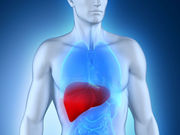Expansion of intestinal Enterococcus faecalis in mice exacerbates ethanol-induced liver disease
TUESDAY, Oct. 17, 2017 (HealthDay News) — Based on data from mouse models and humans, a decrease in gastric acid secretion due to use of gastric acid suppressive medications seems to promote overgrowth of intestinal Enterococcus, which promotes liver disease, according to a study published online Oct. 10 in Nature Communications.
Noting that chronic liver disease is increasing in Western countries and liver cirrhosis is the 12th leading cause of death worldwide, Cristina Llorente, Ph.D., from the University of California San Diego in La Jolla, and colleagues examined the potential correlation between the increasing use of gastric acid suppressive medications and liver disease.
The researchers found that in mice, proton pump inhibitors promote progression of alcoholic liver disease, non-alcoholic fatty liver disease, and non-alcoholic steatohepatitis due to an elevation in the numbers of intestinal Enterococcus species. There was a correlation between translocating enterococci and hepatic inflammation/hepatocyte death. In mice, expansion of Enterococcus faecalis in the intestine was adequate to exacerbate ethanol-induced liver disease. Among alcohol-dependent patients, proton pump inhibitor use was associated with increased risk of developing alcoholic liver disease.
“Recent increases in the use of gastric acid-suppressive medications might contribute to the increasing incidence of chronic liver disease,” the authors write.
Copyright © 2017 HealthDay. All rights reserved.








